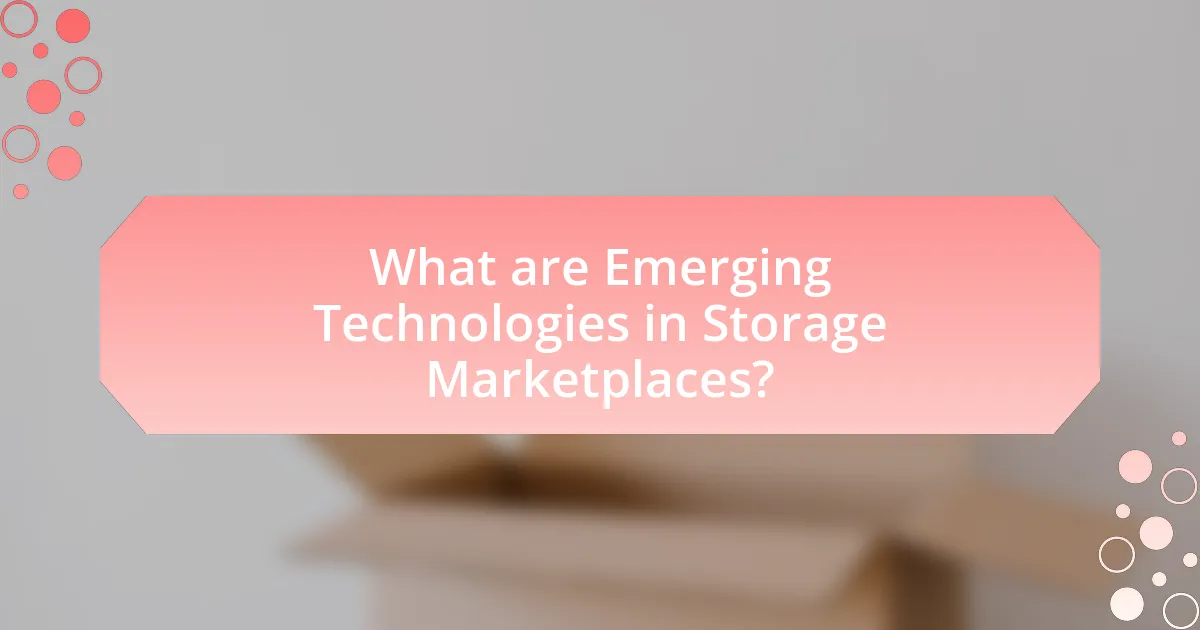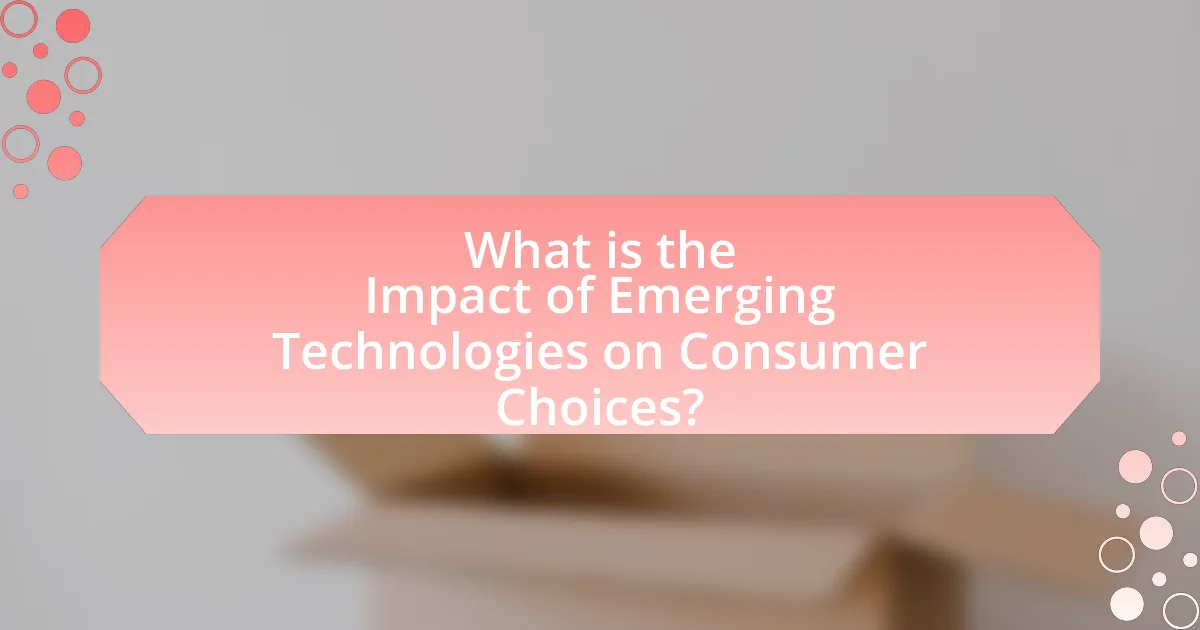Emerging technologies in storage marketplaces, including decentralized storage solutions, blockchain integration, and artificial intelligence-driven data management, are significantly transforming consumer choices. These advancements enhance scalability, security, and efficiency, reshaping how users interact with storage options. Key technologies such as NVMe, cloud storage, and AI-driven management systems are driving this evolution, leading to improved data retrieval, reduced costs, and increased reliability. The rapid evolution of the storage marketplace is influenced by growing consumer demand for flexible solutions, with trends indicating a shift towards more secure and intelligent storage options that cater to diverse needs.
What are Emerging Technologies in Storage Marketplaces?

 |
|
Emerging technologies in storage marketplaces include decentralized storage solutions, blockchain integration, and artificial intelligence-driven data management. Decentralized storage, such as IPFS (InterPlanetary File System), allows users to store data across a network of nodes, enhancing security and reducing reliance on centralized servers. Blockchain technology provides transparency and trust in transactions, enabling secure data sharing and ownership verification. Additionally, artificial intelligence optimizes data retrieval and management, improving efficiency and user experience. These technologies are reshaping consumer choices by offering more secure, efficient, and cost-effective storage options.
How do these technologies redefine storage solutions?
Emerging technologies such as cloud computing, artificial intelligence, and blockchain are redefining storage solutions by enhancing scalability, security, and accessibility. Cloud computing allows users to store vast amounts of data off-site, facilitating easy access from anywhere and reducing the need for physical storage infrastructure. Artificial intelligence optimizes data management and retrieval processes, improving efficiency and reducing costs. Blockchain technology enhances security by providing decentralized and tamper-proof storage options, ensuring data integrity. These advancements collectively transform how consumers interact with storage solutions, making them more flexible and reliable.
What specific technologies are currently emerging in the storage marketplace?
Emerging technologies in the storage marketplace include NVMe (Non-Volatile Memory Express), cloud storage solutions, and AI-driven storage management systems. NVMe technology significantly enhances data transfer speeds and reduces latency compared to traditional storage interfaces, making it increasingly popular in enterprise environments. Cloud storage solutions are evolving with features like edge computing and hybrid cloud models, allowing for more flexible and scalable data management. AI-driven storage management systems utilize machine learning algorithms to optimize data placement and retrieval, improving efficiency and reducing costs. These advancements are reshaping consumer choices by offering faster, more reliable, and cost-effective storage options.
How do these technologies enhance storage efficiency?
Emerging technologies enhance storage efficiency by utilizing advanced data compression algorithms and optimized data management systems. These technologies reduce the physical space required for data storage while maintaining or improving access speeds. For instance, cloud storage solutions often employ deduplication techniques, which eliminate redundant copies of data, leading to significant space savings. According to a study by IDC, organizations that implement these technologies can achieve up to 30% more efficient storage utilization compared to traditional methods.
Why is the storage marketplace evolving rapidly?
The storage marketplace is evolving rapidly due to advancements in technology, increasing consumer demand for flexible storage solutions, and the rise of cloud computing. These technological advancements, such as improved data compression and faster access speeds, enable providers to offer more efficient and scalable storage options. Additionally, the growing trend of remote work and digital transformation has led consumers to seek versatile storage solutions that can accommodate their changing needs. According to a report by MarketsandMarkets, the global cloud storage market is projected to grow from $50.1 billion in 2020 to $137.3 billion by 2025, highlighting the significant shift towards cloud-based storage solutions.
What market trends are driving the adoption of new storage technologies?
The adoption of new storage technologies is primarily driven by the increasing demand for data storage capacity and performance. As businesses and consumers generate and consume vast amounts of data, the need for scalable, high-speed storage solutions has intensified. For instance, the global data sphere is projected to reach 175 zettabytes by 2025, according to the International Data Corporation. This surge in data volume necessitates advanced storage technologies such as solid-state drives (SSDs) and cloud storage solutions, which offer faster access times and greater reliability compared to traditional hard disk drives (HDDs). Additionally, the rise of big data analytics and artificial intelligence applications further fuels the need for innovative storage solutions that can handle complex workloads efficiently.
How do consumer demands influence technological advancements in storage?
Consumer demands significantly influence technological advancements in storage by driving innovation and shaping product development. As consumers increasingly require faster data access, higher capacity, and improved reliability, storage technology evolves to meet these expectations. For instance, the rise of cloud storage solutions has been largely driven by consumer preferences for accessibility and scalability, leading to advancements in data management and security protocols. Additionally, the demand for portable and efficient storage devices has spurred the development of solid-state drives (SSDs), which offer superior speed and durability compared to traditional hard drives. This trend is supported by market research indicating that the global SSD market is projected to grow significantly, reflecting consumer preferences for high-performance storage solutions.
What is the Impact of Emerging Technologies on Consumer Choices?

 |
|
Emerging technologies significantly influence consumer choices by enhancing accessibility, personalization, and convenience in purchasing decisions. For instance, advancements in artificial intelligence and machine learning enable retailers to analyze consumer behavior and preferences, leading to tailored recommendations that increase the likelihood of purchase. A study by McKinsey & Company found that personalized experiences can lead to a 10-30% increase in sales, demonstrating the effectiveness of these technologies in shaping consumer behavior. Additionally, the rise of mobile payment systems and e-commerce platforms has made shopping more convenient, allowing consumers to make purchases anytime and anywhere, further impacting their choices.
How do these technologies affect consumer purchasing decisions?
Emerging technologies significantly influence consumer purchasing decisions by enhancing convenience, personalization, and access to information. For instance, advancements in artificial intelligence and machine learning enable retailers to analyze consumer behavior and preferences, leading to tailored recommendations that increase the likelihood of purchase. A study by McKinsey & Company found that personalized experiences can lead to a 10-30% increase in sales. Additionally, technologies such as mobile payment systems and augmented reality streamline the purchasing process, making it easier for consumers to complete transactions. According to a report by Statista, 54% of consumers prefer shopping with retailers that offer mobile payment options, highlighting the impact of technology on consumer choice.
What factors do consumers consider when choosing storage solutions?
Consumers consider several key factors when choosing storage solutions, including capacity, cost, security, and ease of access. Capacity is crucial as it determines how much data can be stored, influencing the choice between different storage options. Cost affects consumer decisions significantly, as individuals and businesses seek solutions that fit their budget while providing adequate storage. Security is another vital consideration, with consumers prioritizing solutions that offer data protection features, such as encryption and backup options. Lastly, ease of access is important, as users prefer storage solutions that allow for quick retrieval and management of their data. These factors collectively guide consumers in selecting the most suitable storage solutions for their needs.
How do emerging technologies improve user experience in storage marketplaces?
Emerging technologies enhance user experience in storage marketplaces by providing advanced features such as real-time inventory tracking, personalized recommendations, and seamless transaction processes. For instance, the integration of artificial intelligence enables predictive analytics, allowing users to receive tailored suggestions based on their storage needs and preferences. Additionally, blockchain technology ensures secure and transparent transactions, fostering trust among users. According to a report by McKinsey & Company, companies that leverage these technologies can improve customer satisfaction by up to 20%, demonstrating the significant impact of technological advancements on user experience in storage marketplaces.
What role does pricing play in consumer choices regarding storage technologies?
Pricing significantly influences consumer choices regarding storage technologies by directly affecting perceived value and affordability. Consumers often evaluate storage options based on their budget constraints and the cost-to-benefit ratio of different technologies. For instance, a study by Statista in 2023 indicated that 70% of consumers prioritize price when selecting storage solutions, highlighting that lower-priced options tend to attract more buyers, especially in competitive markets. Additionally, as new storage technologies emerge, such as SSDs and cloud storage, their pricing strategies can either encourage or deter adoption, with consumers often gravitating towards solutions that offer the best performance for the price.
How do emerging technologies influence the cost of storage solutions?
Emerging technologies significantly reduce the cost of storage solutions by enhancing efficiency and scalability. Innovations such as cloud computing, solid-state drives (SSDs), and artificial intelligence (AI) optimize data management and storage processes, leading to lower operational costs. For instance, the adoption of cloud storage has decreased the need for physical infrastructure, allowing companies to pay only for the storage they use, which can lower expenses by up to 30% compared to traditional storage methods. Additionally, advancements in SSD technology have led to price reductions of over 50% in the last five years, making high-speed storage more accessible. These technological improvements not only drive down costs but also increase competition in the market, further benefiting consumers.
What pricing strategies are being adopted in the storage marketplace?
Dynamic pricing strategies are being adopted in the storage marketplace, allowing providers to adjust prices based on demand fluctuations and consumer behavior. This approach enables companies to optimize revenue by charging higher rates during peak demand periods while offering discounts during off-peak times. For instance, research by McKinsey & Company highlights that businesses utilizing dynamic pricing can increase their revenue by up to 25% compared to static pricing models. Additionally, subscription-based pricing is gaining traction, where consumers pay a recurring fee for access to storage services, providing predictable costs and fostering customer loyalty. This strategy aligns with trends in the broader subscription economy, which has seen significant growth, with the subscription box market alone projected to reach $1.2 billion by 2023.
What are the Future Trends in Storage Marketplaces?

 |
|
Future trends in storage marketplaces include the increasing adoption of cloud storage solutions, the rise of decentralized storage systems, and the integration of artificial intelligence for data management. Cloud storage continues to grow due to its scalability and accessibility, with the global cloud storage market projected to reach $137.3 billion by 2025, according to a report by MarketsandMarkets. Decentralized storage, utilizing blockchain technology, offers enhanced security and user control, appealing to privacy-conscious consumers. Additionally, AI-driven analytics are being implemented to optimize storage efficiency and improve user experience, as evidenced by advancements in smart storage solutions that adapt to user behavior. These trends reflect a shift towards more flexible, secure, and intelligent storage options that cater to evolving consumer needs.
How will emerging technologies shape the future of storage solutions?
Emerging technologies will significantly shape the future of storage solutions by enhancing capacity, speed, and efficiency. Innovations such as solid-state drives (SSDs), non-volatile memory express (NVMe), and cloud storage advancements are driving this transformation. For instance, SSDs provide faster data access and lower latency compared to traditional hard drives, while NVMe technology allows for higher data transfer rates, improving overall system performance. Additionally, the rise of cloud storage solutions enables scalable and flexible data management, catering to the growing demand for remote access and collaboration. According to a report by MarketsandMarkets, the global cloud storage market is projected to grow from $50.1 billion in 2020 to $137.3 billion by 2025, highlighting the increasing reliance on cloud-based storage solutions.
What innovations can we expect in the next few years?
In the next few years, we can expect significant innovations in the storage marketplace driven by advancements in artificial intelligence, blockchain technology, and enhanced data analytics. These innovations will improve efficiency, security, and user experience in storage solutions. For instance, AI algorithms will optimize storage management by predicting usage patterns and automating resource allocation, leading to cost savings and improved performance. Blockchain technology will enhance data security and transparency, allowing for decentralized storage solutions that protect user data from breaches. Additionally, advanced data analytics will provide consumers with insights into their storage needs, enabling more informed choices and personalized services. These trends are supported by ongoing research and development in the tech industry, indicating a strong trajectory towards smarter and more secure storage solutions.
How will consumer preferences evolve with these technological advancements?
Consumer preferences will evolve towards greater personalization and convenience due to technological advancements in storage marketplaces. As technologies such as artificial intelligence and machine learning enhance data analysis, consumers will increasingly expect tailored recommendations and seamless user experiences. For instance, a study by McKinsey & Company found that 71% of consumers prefer personalized interactions, indicating a strong demand for customized services. Additionally, advancements in mobile technology and cloud storage solutions will lead consumers to prioritize accessibility and flexibility, allowing them to manage their storage needs from anywhere. This shift is supported by the growing trend of remote work and digital lifestyles, which further emphasizes the need for efficient and user-friendly storage options.
What best practices should consumers follow when choosing storage technologies?
Consumers should prioritize compatibility, capacity, performance, and reliability when choosing storage technologies. Compatibility ensures that the storage device works seamlessly with existing hardware and software, which is crucial for avoiding integration issues. Capacity refers to the amount of data the storage can hold; consumers should assess their current and future storage needs to select an appropriate size. Performance is measured by speed and access times, which affect how quickly data can be retrieved or written; faster technologies like SSDs generally outperform traditional HDDs. Reliability is critical, as it pertains to the durability and lifespan of the storage device; consumers should consider products with good reviews and warranties, as well as those that utilize error-correcting codes to prevent data loss. Following these best practices helps consumers make informed decisions that align with their specific requirements and usage scenarios.
How can consumers stay informed about emerging storage technologies?
Consumers can stay informed about emerging storage technologies by following industry news, subscribing to technology blogs, and participating in online forums. These sources provide timely updates on advancements and trends in storage solutions. For instance, websites like TechCrunch and Ars Technica regularly cover new storage technologies, while forums such as Reddit’s r/hardware allow users to discuss and share insights. Additionally, attending technology conferences and webinars can offer firsthand knowledge from experts in the field.
What considerations should consumers keep in mind for future-proofing their storage choices?
Consumers should prioritize scalability, compatibility, and data security when future-proofing their storage choices. Scalability ensures that storage solutions can grow with increasing data needs, allowing for seamless upgrades without complete system overhauls. Compatibility with various devices and platforms is crucial, as it guarantees that the storage solution will work with current and future technologies, preventing obsolescence. Data security is essential to protect sensitive information against breaches and loss, making it vital to choose storage options that offer robust encryption and backup features. These considerations are supported by industry trends indicating that businesses increasingly demand flexible and secure storage solutions to adapt to evolving technological landscapes.


